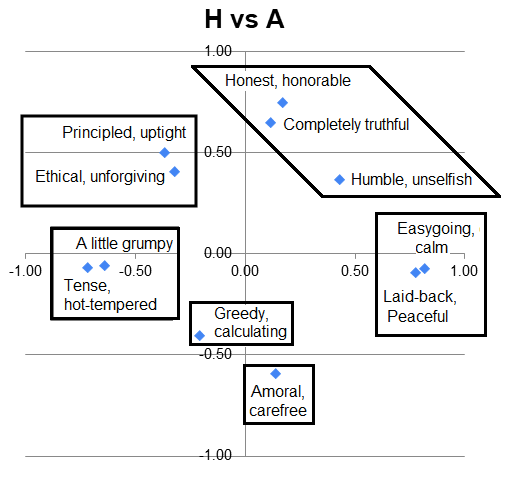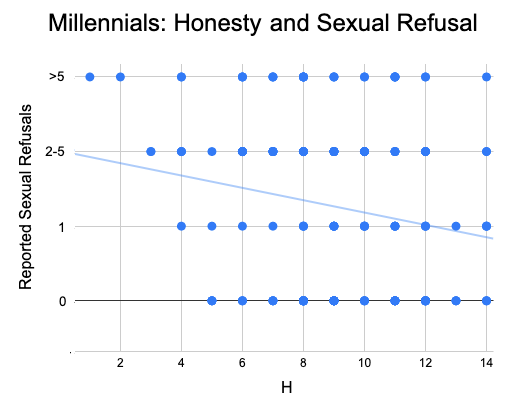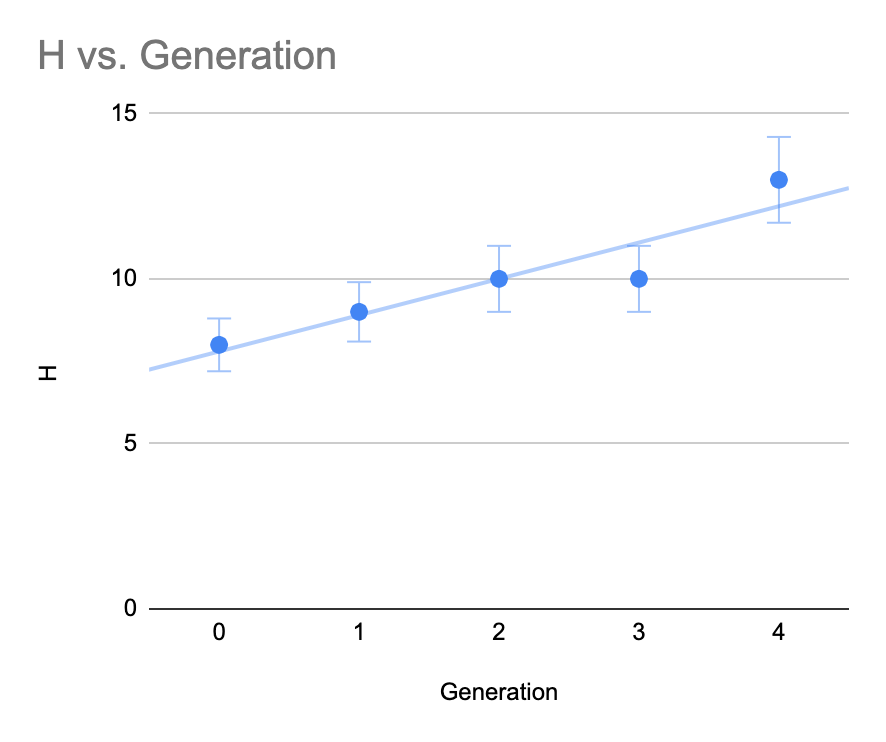Well, the survey is over. Thank you to all 304 people who participated!
I’m analyzing the results, which I’ll present in a series of three separate posts. I couldn’t announce the survey hypotheses before collecting the data, but I can, now:
In the past, I’ve verified that the Five Factor Model is too limited to describe human personality variation—particularly variation in ethical proclivities. I predict that two-factors of personality Agreeableness and Honesty will be cleanly recovered through a confirmatory factor analysis.1 (This is kindof a sanity check on the survey. If I can’t get H and A to replicate, then I can’t continue with #2 or #3)
Some published studies imply that honest people will be less sexual. I’m guessing that honest people will say no to sex more often, and won’t be as turned on by the really weird sexual stuff. So I predict that (2a) Honesty will correlate positively with the number of sexual advances a person rejects, and will predict people declining because they were in a relationship or dislike casual sex, and (2b) Honesty will correlate negatively with how extreme a persons most extreme sexual fetish is.
I’ve previously reported that utilitarians are rather cynical and less morally motivated than other people. Here I expect to find that utilitaritarianism is explicitly related to an unethical personality in the form of low Honesty.
Elsewhere, I’ve found four factors of political values. Although I didn’t have enough space in the survey to expect a clean replication of the fourth factor, I do expect to see three factors emerge: A left-right factor, a pragmatism-idealism factor, and a smaller libertarian-paternalism factor. (I am less sure about the libertarian factor—it hasn’t always appeared in smaller community samples.)
Rounding out the political map, I want to investigate four areas new to me: Physical excellence, sexuality, dogmatism, and urban residence, which I haven’t studied before. Firstly I predict that (5a) athleticism, height, and attractiveness will relate to pragmatic conservatism, while (5b) taboo kinks will relate to pragmatic, libertarian leftism, and (5c) dogmatism will related to idealistic conservatism (some studies tend to find that religious conservatives are more dogmatic than others). Lastly, it’s pretty well known that (5d) people living in rural areas are more conservative, and I expect to verify that as well.
Recent years have seen the rise of “wokeness.” Wokeness values antiracism and transgenderism, set amidst a backdrop of concern for fairness and equality; critics note that these issues are promoted at the expense of open dialogue and free expression.2 I believe these attitudes have an underlying similarity which makes them distinct from other leftist values (like for example secularism, socialized healthcare, or drug freedoms). So I predict that these attitudes will broadly cluster not only on the left, but also in the idealistic and paternalistic regions of the political map (where those of us who make Apple Pies obsessively don’t live).
A large body of research establishes those on the political right are more organized, but less imaginative than people on the political left. But some indicators also suggest conservatives are more honest, as well as being less intelligent. So I predict conservatism will correlate positively with Honesty and Conscientiousness, and negatively with Openness and mental ability. (Because my measure of intelligence is extremely rough, my expectations about mental ability aren’t really firm.)
Less well known is personality research into pragmatism and idealism. Here I predict that I will replicate previous findings: idealism will correlate with Honesty, Agreeableness, Emotionality, and (weakly) with Extraversion, leaving more pragmatic individuals to score lower on all those personality traits.
Note I’m not merely hypothesizing things I already believe—I’m making hypotheses about some hunches, and a few things I’m just curious about. I don’t think it’s good practice to gather data and then put it through the wringer; I may well do that, but if you test 1000 relationships, your should expect around 10 of them will reach p < 0.01 spuriously. If I find something I wasn’t specifically looking for, that’s less convincing to me personally—I value using statistics with a bit of care.
This week I’ll be examining hypotheses 1, 2, and 3.
Ladies, gentlemen, and others, place your bets! Now is the time to decide whether you think these hypotheses will pan out, or whether they weren’t the right ones to make. Ready?
Hypothesis 1: Are Agreeableness and Honesty independent, replicable dimensions of personality?
Previously I replicated the HEXACO finding of a broad moral dimension independent of classical Agreeableness. The most accurate term for this dimension is probably “Honesty-honor” but given that no one else is using that term, I’m just referring to it as Honesty with a capital H—a broad trait describing principled and ethical people motivated by honesty, honor, truth, and selflessness.
Here’s how this turned out.
Below left is my previous factor analysis (n = 3196) of 11 items; at right you can find the results my most recent survey (n = 298 after removing careless and unserious responses), where space was at a premium, so I could only ask 6 questions. No rotation was required, and the space was virtually unchanged despite a sample of less than a tenth the original size and the omission of half the items.


What more can I say? Someday people who really ought to understand this just might actually understand it.
Hypothesis 2A: Do Honest people turn down offers for sex?
Knowing that my questions do cleanly measure two dimensions of morality, I’m ready to ask about how Honesty relates to sexuality. The survey had two questions I wanted to make use of. The first question asked:
Have you ever declined an offer of having sex with a new partner? (Count all the times when you believed someone more or less subtly flirted with you in order to offer instant sex and you chose not to flirt back)
Given that the number of opportunities a person has to refuse sex increases over time, I separated the survey out by age group. I didn’t have enough Boomers or Silents for a good analysis of their Here are the results for Gen Z, Millennials, and Gen X:
So I was wrong! And there could, possibly, be something more going on—a change in sexual patterns that somehow affects the way people engage with potential sexual partners; a change which could relate to a possible reduction in generational Honesty over time, which I wasn’t expecting, but was hard not to notice in the data:
Declining Honesty would definitely fit the theme of a decaying civilization. But I do think it would be premature to make much of the idea that Honesty has been decreasing from one generation to the next. Not only did I not anticipate checking this, but the relationship confounds physical and psychological age with birth year. If I’d given the survey to the Silents when they were twenty, and then Boomers when they were twenty, and then Gen X and so on, then we’d know it was generation and not age that was responsible. But without that… Well maybe society isn’t losing its moral fiber; it’s quite reasonable to suggest that people have always just gotten more virtuous and upright with age—It’s long been kown that symptoms of low Honesty, like psychopathy and criminality, drop as people get older.34
I don’t want to just ignore this, but I wasn’t expecting it, and have no clear way of explaining it at present. Perhaps some of my readers will have a better idea how to interpret this? Definitely it’s interesting to consider, in just the same way as it’s interesting to consider the idea that sexual patterns could have been changing over time so that when I was growing up, honesty manifested itself differently than today. If there is anything here, it is probably indeed only affecting the younger generations—there’s no significant correlation between Honesty and sexual refusal across the entire sample (r = -0.10, p = 0.08).
Last of all, Honest people were no more likely than others to refuse sex because they were in a relationship, or because casual sex isn’t worth it. Even restricting the analysis to people who refused sex at least once, there was never any significant relationship.
Hypothesis 2B: Are Interests in Taboo Fetishes Related to Low Honesty?
The second question referenced Aella’s recent kink survey:
If you visit this link, you'll find a survey on personal kinks. (Warning, some are pretty taboo) Looking through the graph, find the kink you like that's the farthest to the right. What is the Average Taboo Rating of that kink?
Again, I’m comparing the most extreme fetish from Aella’s graph here that a person finds exciting to Honesty, predicting that more Honesty relates to lower interest in taboo fetishes. And I find:
Nothing! The correlation with H was a nonsignificant r = -0.05. Yes, the relationship was in the correct direction, and yes, there were a lot of people who opted out of this question for semi-obvious reasons. But that relationship is so weak that even if it were significant I wouldn’t care.
On a hunch, I checked the usual suspects of Extraversion, Openness, and mental ability (IQ), and found two significant relationships:
These weren’t expected, so not too much can be made of them. And even if they’re genuine, the relationships aren’t very strong; it’s quite plausible that they just arose by chance. And the survey we used had just about the quickest and roughest measure of mental ability you could include—two questions only, one on verbal logic and the other on 3D rotation, so the only possible scores there were 0, 1 and 2.
Still, rough gagues tend to weaken a signal, rather than create spurious signals; it might be worth revisiting another time with better measures. And the results would be pretty interesting, if they could be properly established—could taboo turnons actually be a sign of a healthy mind? (I’m just going to go on record and say there are some turnons in the lower right corner of that graph that really don’t seem too healthy.)
Hypothesis 3: Are Utilitarians Lower in Honesty than others?
Participants were asked to indicate their level of agreement with utilitarian ethics in the form of this statement: “The morally right action is the one that maximizes everyone’s overall happiness (or utility).” Greater endorsement of utilitarianism was modestly, but significantly, associated with diminished ethical focus:
(In case you’re wondering—there were no significant interactions with generation.)
I originally wrote about this in response to Brett Anderson, who had a bombastic intricate Nietzschean warning about dangers presented by “the good and the just,” meaning, he presumed, utilitarians. But insofar as I can identify the good and the just, they’re people who are ethical, principled, honorable, truthful, and humble—people high in Honesty. And fine, some utilitarians do fit the description, but generally speaking, utilitarians are less like this than most people. So if Friedrich Nietzsche had some remonstrances against the good and the just, he either had no idea what he was talking about, or else, he didn’t mean utilitarians. (Note to thinkers who like to draw conclusions rationally from what is plausible, rather than by checking the facts: reality isn’t always rational.)
So OK, but what about Agreeableness? Here I made no prediction, because I really could see things either way. Maybe utilitarians are forgiving and peaceful? Maybe utilitarians are angry and hold grudges? For the sake of satisfying curiosity, I checked—there’s no significant relationship.
Conclusion
So overall? I got two out of three. The HEXACO model returns interesting results older personality models don’t, revealing that utilitarians are slightly less morally motivated than others, though they aren’t any less peaceful, forgiving, or Agreeable than anyone else. And there are some intriguing suggestions that having taboo turn-ons might be for the sensitive and intellectual, and that society’s sexual trends have been changing across the generations.
But up to now we haven’t really considered political values or physical variables. How do they relate to any of this? I’ve stayed up far too late tonight, but I’m also too curious to let this sit for long. I may have more to show you before next Friday. We’ll see.
Wessa, P. (2023), Free Statistics Software, Office for Research Development and Education, version 1.2.1, URL https://www.wessa.net/
Wokeness: A Guide for Advocates. (2023, April 4). Navigator Research. Retrieved November 16, 2023, from https://navigatorresearch.org/wp-content/uploads/2023/04/Navigator-Update-04.04.2023.pdf
Farrington, D. P. (1986). Age and crime. Crime and justice, 7, 189-250.
Bushway, S. D., Brame, R., & Paternoster, R. (2013). Connecting desistance and recidivism:: Measuring Changes in Criminality Over the Lifespan. In After crime and punishment (pp. 85-101). Willan.












Thanks. The whole age/experience/time dynamic needs better nutting out.
Also I reckon (suggest as lead) that values are outcomes, more than causes. Not saying you're investigating them that way, but using them as like animistic tree spirits… might be they are just saplings or grandees of the forest using outcomes as handy labels, but that's not how they got there.
And another thing, any control for narcissism/psychopathy per se, if they are actual parasites rather than part of the rich diversity of life, is there an argument to control for their capture of that part of the spectrum. ????? maybe???? Sure it's a spectrum, sure things average out with age but.
I say this because I have seen covert and grandiose narcissists espouse all sorts of positions and values depending on the audience (i.e. otherwise incoherent positions) and what is seen (in the moment) as a good way to manipulate them. And I don't just mean standout mountebanks like the Petersen or Sam Bankman-Fried (Yuuuup, effective altruism). I've come across them in all groups, in all parts of the spectrum, where maintaining their membership to any group/view is more based on their tactical familiarity with their targets for generating supply/control/cash who happen to be in group/view X.